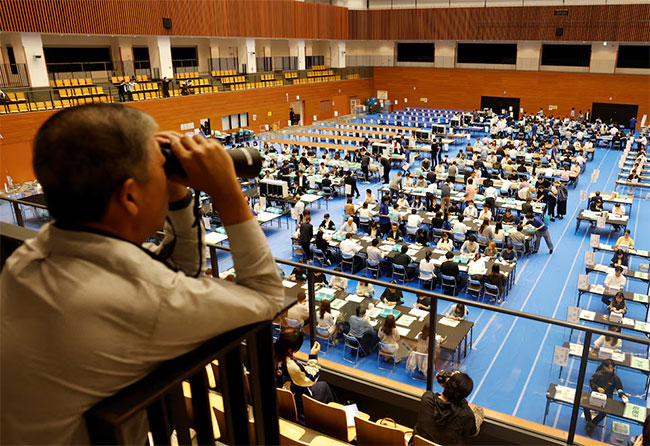Japan’s Political Landscape in Turmoil: The Aftermath of the Recent Election
The recent elections in Japan have left the political landscape in disarray, with no party emerging with a straightforward ability to govern. Voters have expressed their discontent towards Prime Minister Shigeru Ishiba’s ruling coalition, responding to the ongoing scandals and the growing cost-of-living crisis. This election marks a significant moment for Japan, as the ramifications could affect not only the domestic economy but also its standing amidst rising tensions in East Asia.
 The election results have left Japan’s political future uncertain.
The election results have left Japan’s political future uncertain.
Shifting Power Dynamics
As results poured in, it became clear that the ruling coalition, comprising the Liberal Democratic Party (LDP) and its junior partner, Komeito, had suffered a substantial loss, securing only 215 seats down from 279. This unexpected change indicates severe voter backlash against Ishiba’s handling of a recent funding scandal linked to his administration. The Liberal Democratic Party, which has dominated Japanese politics for decades, now faces formidable challenges as the Constitutional Democratic Party of Japan (CDPJ) emerged as a significant contender with 148 seats, a dramatic increase from their previous 98.
The Cost of Scandals
The decreased popularity of Ishiba can be attributed to a deepening trust deficit among voters regarding the LDP’s transparency and governance. Just weeks before the elections, damning reports surfaced about unaccounted campaign funds that had further tarnished the image of the ruling party. Analyst Tobias Harris, founder of Japan Foresight, stated, > “Whether or not Prime Minister Shigeru Ishiba resigns as LDP leader today, it seems unlikely that he will survive to lead a new government as prime minister.” This sentiment hints at the dire situation facing not just Ishiba, but the entire LDP moving forward.
The stakes are high for the parties involved. As factions within the LDP grapple with their identity and mission, smaller parties like the Democratic Party for the People (DPP) are taking this opportunity to voice their positions more fervently. DPP’s proposals to cut the nation’s 10% sales tax and questioning the Bank of Japan’s monetary policy suggest that the ruling coalition might need to adopt less traditional approaches if they wish to maintain power.
 Political strategies are shifting as emerging parties gain traction.
Political strategies are shifting as emerging parties gain traction.
What’s Next for Japan?
As political parties enter a rigorous negotiation phase to form a stable government (with a bureaucratic deadline of 30 days), the uncertainty has led to fluctuations in the national currency, causing the yen to drop to a three-month low. This is indicative of a general unease among investors and economists in regard to Japan’s ability to navigate its current political crisis.
Economic challenges are compounded by international security concerns. With an increasingly assertive China and the threats posed by North Korea, Japanese voters’ decision reflects awareness of both domestic governance issues and broader geopolitical dynamics. In light of these external pressures, the outcome of these negotiations could lead to notable policy shifts that either bolster or weaken Japan’s standing in the region.
The Rise of Women in Politics
In a notable twist within an otherwise troubled election, a record number of 73 women were elected to Japan’s parliament, surpassing the previous high of 54 set over a decade ago. This could signal a slow but sure shift towards a more inclusive political environment, at least in terms of gender representation. As more voices join the national conversation, there may be hope for reformist policies that can effectively address pressing issues facing the populace.
 Women’s representation in parliament marks significant progress for gender equality in Japan.
Women’s representation in parliament marks significant progress for gender equality in Japan.
Conclusion
Japan stands at a crossroads as the dust settles from the recent elections. The scandal-ridden environment coupled with voter frustration suggests that long-standing political norms may be challenged in the weeks to come. While the LDP scrambles to retain power amid potential shifts in policy and alignment, the emergence of alternative parties represents a volatile but hopeful promise for a more dynamic political discourse in Japan. The next few weeks will not only determine the fate of Prime Minister Ishiba but could also redefine the future of Japan’s democracy itself.


 Photo by
Photo by 












